
Film noir is a cinematic term used primarily to describe stylized Hollywood crime dramas, particularly those that emphasize cynical attitudes and motivations. The 1940s and 1950s are generally regarded as the "classic period" of American film noir. Film noir of this era is associated with a low-key, black-and-white visual style that has roots in German Expressionist cinematography. Many of the prototypical stories and attitudes expressed in classic noir derive from the hardboiled school of crime fiction that emerged in the United States during the Great Depression.
A gangster is a criminal who is a member of a gang. Most gangs are considered to be part of organized crime. Gangsters are also called mobsters, a term derived from mob and the suffix -ster. Gangs provide a level of organization and resources that support much larger and more complex criminal transactions than an individual criminal could achieve. Gangsters have been active for many years in countries around the world. Gangsters are the subject of many novels, films, television series, and video games.

Performance is a 1970 British crime drama film directed by Donald Cammell and Nicolas Roeg, written by Cammell and filmed by Roeg. The film stars James Fox as a violent and ambitious London gangster who, after killing an old friend, goes into hiding at the home of a reclusive rock star.
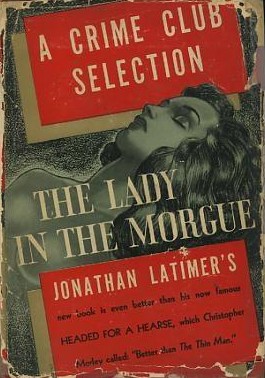
The Lady in the Morgue (1936) is one of the novels by Jonathan Latimer featuring private detective William Crane. The lady of the title is a female corpse which is stolen from a Chicago morgue before the dead woman's identity can be established.
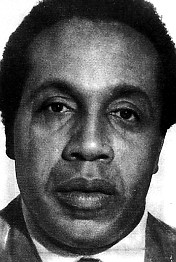
Frank Lucas was an American drug lord who operated in Harlem, New York City, during the late 1960s and early 1970s. He was known for cutting out middlemen in the drug trade and buying heroin directly from his source in the Golden Triangle in Southeast Asia. Lucas boasted that he smuggled heroin using the coffins of dead American servicemen, as depicted in the feature film American Gangster (2007), which fictionalized aspects of his life. This claim was denied by his Southeast Asian associate Leslie "Ike" Atkinson.
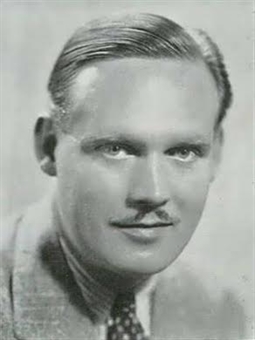
Cyril William North Raymond MBE was a British character actor. He maintained a stage and screen career from his teens until his retirement, caused by ill health, in the 1960s.

Flora Le Breton was an English silent film actress from Croydon, Surrey, England. She was a dainty blonde with dark blue eyes. In the UK she was called both "the British Mary Pickford" and "the English Mary Pickford".

The Homecoming is a 1973 British-American drama film directed by Peter Hall based on the play of the same name by Harold Pinter. The film was produced by Ely Landau for the American Film Theatre, which presented thirteen film adaptations of plays in the United States from 1973 to 1975. The film was screened at the 1974 Cannes Film Festival, but was not entered into the main competition.

The Man from Hong Kong, originally released in the US as The Dragon Flies, is a 1975 action film written and directed by Brian Trenchard-Smith in his directorial debut and starring Jimmy Wang Yu and George Lazenby, with Hugh Keays-Byrne, Roger Ward, Rosalind Speirs, Rebecca Gilling, Sammo Hung, Grant Page and Frank Thring in supporting roles. The first film to be made as an international coproduction between Australia and Hong Kong, it serves as a satire of the James Bond and Dirty Harry franchises, combined with tropes of the concurrent chopsocky craze. Its plot follows Inspector Fang Sing Leng (Wang) of the RHKPF's Special Branch, who travels to Sydney to perform an extradition, only to find himself locked in battle with Jack Wilton (Lazenby), the city's most powerful crime lord.
The depiction of Colombia in popular culture, especially the portrayal of Colombian people in film and fiction, has been asserted by Colombian organizations and government to be largely negative and has raised concerns that it reinforces, or even engenders, societal prejudice and discrimination due to association with narco-trafficking, terrorism, illegal immigration and other criminal elements, poverty and welfare. The Colombian government-funded Colombia is Passion advertisement campaign as an attempt to improve Colombia's image abroad, with mixed results hoping for more positive views on Colombia.
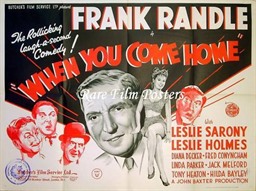
When You Come Home is a 1948 British comedy film directed by John Baxter and starring Frank Randle, Leslie Sarony and Leslie Holmes.

Charley's Aunt is a 1930 American pre-Code comedy film directed by Al Christie and starring Charles Ruggles, June Collyer, and Hugh Williams. It was an adaptation of the 1892 play Charley's Aunt by Brandon Thomas. It marked the film debut of Williams, who then returned to Britain and became a major star.
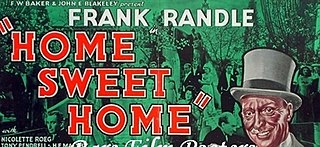
Home Sweet Home is a 1945 British musical comedy film directed by John E. Blakeley, written by Roney Parsons and Anthony Toner, and starring Frank Randle, Nicolette Roeg and Tony Pendrell. Set in the fictitious town of Redvale, the film is largely a vehicle for slapstick routines by Randle.
John Marlborough East (1860–1924) was a British stage and film actor. He was an early film star who received over 3,000 votes in Picturegoer magazine's 1916 contest to establish the "Greatest British Film Player". He was a founder of the Neptune Studios in Borehamwood, which is today the site of Elstree Studios. However, his career rapidly declined. He made his final picture Owd Bob in 1924, and died the same year.
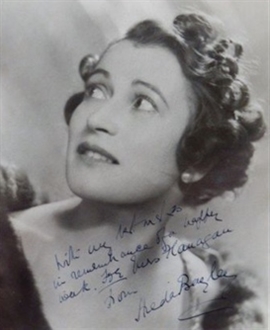
Hilda Christabel Bailey was a British theatre and film actress. On stage from 1913, she was in both stage and film versions of Carnival in 1918 and 1921, respectively; and in the controversial crime film Cocaine in 1922.
A Soul's Awakening is a 1922 British silent drama film directed by W. P. Kellino and starring David Hawthorne, Flora le Breton and Ethel Oliver. It was made at Lime Grove Studios in Shepherd's Bush. It is also known by the alternative title What Love Can Do.
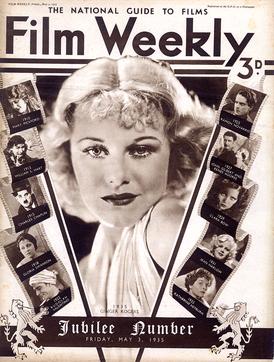
Film Weekly was one of the leading popular film magazines published in the United Kingdom during the late 1920s and 1930s.

A gangster film or gangster movie is a film belonging to a genre that focuses on gangs and organized crime. It is a subgenre of crime film, that may involve large criminal organizations, or small gangs formed to perform a certain illegal act. The genre is differentiated from Westerns and the gangs of that genre.
Salvatore "Sal" Cazzetta, also known as "La Barbe", is a Canadian former outlaw biker and gangster who founded the Rock Machine Motorcycle Club and later joined the Hells Angels following the Quebec Biker War. He was also a longtime associate of the Rizzuto crime family of Montreal.

A Gipsy Cavalier is a 1922 British historical drama film directed by J. Stuart Blackton and starring Georges Carpentier, Flora le Breton and Rex McDougall. It was one of three films made in Britain during the early 1920s by the British-born American founder of Vitagraph Studios. All involved elaborate sets, costumes and extras and set an example of showmanship to emerging British filmmakers. It was adapted from the novel My Lady April by John Overton.














